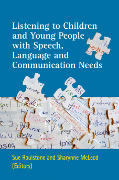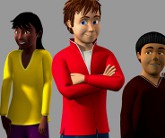Finding the 'invisible' voice of children with speech and language needs
 New publication: A group of experts in speech, language and communication has teamed up to create a book about the importance of listening to children with SLCN.
New publication: A group of experts in speech, language and communication has teamed up to create a book about the importance of listening to children with SLCN.
Listening to Children and Young People with Speech, Language and Communication Needs, edited by Sue Roulstone and Sharynne McLeod, features chapters by many well-known experts in the field including The Communication Trust's Professional Director Wendy Lee, Hazel Roddam PhD, Chair of Council at the Royal College of Speech and Language Therapists, and Chris Markham PhD, a senior lecturer from University of Portsmouth.
Chapters have also been contributed by Abigail Beverly – a young person who grew up with speech and language difficulties and graduated from Central St Martin's in London – and Robbie Simons, a student with Asperger's Syndrome who took part in the Speech and Language Therapy Project.
It is widely known that there are great benefits to consulting children with speech, language and communication needs, but very little has previously been written about the challenges involved in the process.
The editors and authors of the book, published by J&R Press, have pledged to donate £1.50 from the sale of each book to Afasic, a charity which supports children with speech and language difficulties and their parents.
In the book, the authors look at:
- The voice of the children and young people with speech, language and communication needs
- Insights from researchers, speech and language therapists, social workers, psychologists, teachers, advocates and parents
- A diversity of disciplines: health, education and social care
- A range of creative techniques and solutions for listening to children and young people
- Links to service implications.
Linda Lascelles, Chief Executive Officer at Afasic, said: "We're delighted to have contributed to this book and that the authors have decided to give all the royalties to Afasic. This will go towards our work in helping children who have a speech and language impairment. Too often this group of children is invisible. If we are to understand what they want from services and how they can best be tailored to meet their needs, it is crucial for us to listen and consult with them."
Sue Roulstone said "It has been a fantastic experience to collaborate with so many knowledgeable people. The book is full of their expertise in listening to the voices of those with speech, language and communication needs. Professor McLeod and I hope that the book provides a useful resource and stimulus to others who work with these children and young people."
The book is available to order from publisher JR Press priced at £19.99 (not including postage and packing). To order a copy visit the website here.


 The Secret Agent Society is an internationally recognised group program that teaches emotion regulation and social skills to 8 to 12 year-olds with Autism Spectrum Conditions (Asperger type).
The Secret Agent Society is an internationally recognised group program that teaches emotion regulation and social skills to 8 to 12 year-olds with Autism Spectrum Conditions (Asperger type).  Practical resources for parents, carers and professionals:
Practical resources for parents, carers and professionals: What are the causes of malnutrition, the solutions, and the politics? This report sets out six steps to tackle the crisis.
What are the causes of malnutrition, the solutions, and the politics? This report sets out six steps to tackle the crisis. 